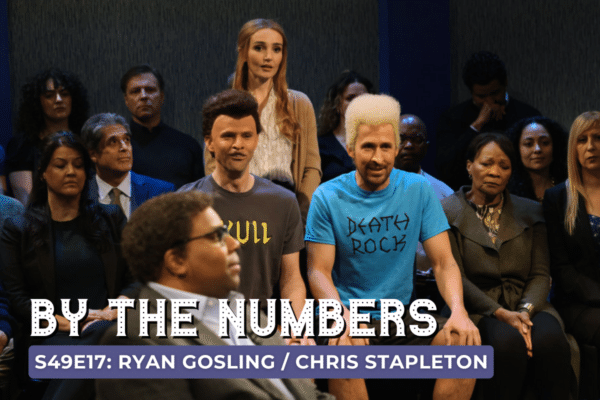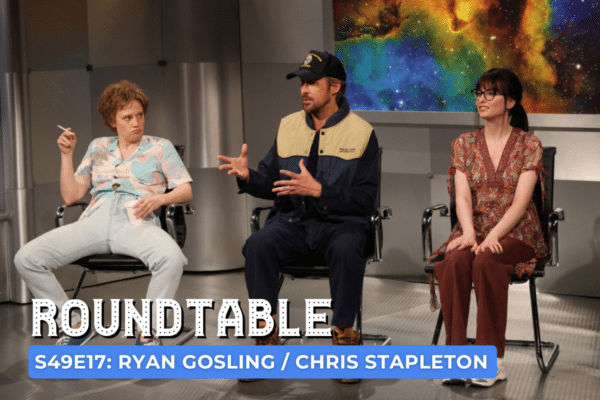
Who is hosting The Daily Show this week?
If you said Jon Stewart you get 25 percent credit. For the other 75 you have to know the name Michael Kosta, because he’s following Stewart’s now-regular Monday night showcase with three nights behind the TDS desk this week, a role Kosta has been handling with some frequency in recent months.
Kosta is the self-described “big, straight, white male, standing there looking solid, doesn’t look too bad in a suit,” whose first piece on air for TDS was going around New York City encountering people who mistook him for Donald Trump Jr., as various shady guys with Russian accents handed him briefcases full of cash.
A joke, of course. Kosta doesn’t really look much like Junior. For one thing he’s in better shape. He used to be a professional tennis player.
Kosta could maybe be called a “host-in-waiting,” but he wouldn’t be alone among “Daily Show” performers with that honorific. It’s complicated.
The long-time Comedy Central hit has been in a period of transition (corporate speak for limbo) since the departure of Trevor Noah, who succeeded Stewart in the role of permanent host and extended the run of exceptional, super-topical comedy Stewart ignited during his 16-year tenure.
After a dance of the seven veils round of weekly hosting from some guest comedy names (Sarah Silverman, Leslie Jones, Kal Penn, Al Franken, et al), several members of the show’s roster of “correspondents” had been taking turns sitting in Stewart’s and Noah’s old position.
Then news dropped from the show-business firmament: Jon was coming back as host—Monday nights only—at least through election day.
“It was a huge surprise,” Kosta said. “It was announced to the staff as a surprise and there was a very positive reaction.”
Beyond the chance to work with the Daily Show MVP, Kosta said the development was welcomed because things at the show were a bit… unsettled. “We had Trevor leaving, and the guest hosting and there was a strike in there, so the uncertainty was just so high,” Kosta said. “And there is a quote/unquote certainty that comes from someone like Jon. The announcement of Jon is also the network telling us: you’re going to be around for a while.”
And being around means needing a host—or hosts. Generally, in late-night television, having an identifiable host viewers want to share their last waking moments with is about as vital as sunlight. You can live without it for a while, but it starts to get depressing.
Johnny Carson, who knew something about success in late night, put it succinctly: “These shows are about the guy behind the desk.”
Let’s make that “person behind the desk” now. But the point stands. Viewers tend to say “I’m watching Colbert” or “I’m watching Kimmel.” Not a show with a generic name hosted by not-Johnny, come lately.
A host rotation works against that nightly association with a voice and point of view; a weekly association is not really the same thing.
Kosta gets that but he’s also thrilled to be where he is.
After ending that pro tennis career, Kosta had a job as assistant men’s tennis coach for the University of Michigan. “I was on track to really be in the tennis world,” he said. “I was making $29,000 a year.”
But comedy called. He told himself if he could make that much doing stand-up he’d rather do comedy. He set out for Los Angeles and worked enough to surpass that yearly bounty. He was eventually invited by TDS to audition for an opening as a correspondent by creating a “desk piece.”
Kosta wrote one about gun ownership and whether it turned out to be what the nation’s forefathers envisioned. He was asked to write another and come to New York to perform it. He did. It went well so he was asked to return later that day and perform it for the studio audience, pre-show.
He got laughs. “They told me to hold in the green room, which is very strange after your audition to be held. Then Trevor and five executives came in and said you’re hired. It’s really a cliché, but it changed my life.”
Kosta has done numerous correspondent reports since, playing his “buffoonish dumb white guy.” But he acknowledged that has become a bit tricky when he shifts to host mode. “When [you’re] at the desk, you have to do a lot less of the character.”
Working with Stewart has been a learning experience, he said, both in handling that transition and in understanding that finding the sweet spot in hosting takes time. Recently Stewart asked him to assess how it was going. Kosta told him: “I feel like I’ve been wearing my Dad’s suit, my grandpa’s suit. I just feel clunky. And Jon said: ‘If you want to see clunky watch the first five years I hosted.’ “
The lesson is an old one in late night: “It just takes time.”
At the moment, it also includes the challenge of following one of the hottest acts ever to work a late-night desk. Stewart remains one of those “names”—as in “I’m watching Dave; I’m watching Conan; I’m watching Fallon.” The show doesn’t even have a set running time when Jon hosts. During his return, he has run long several times.
Kosta said: “It’s Jon. He has a lot he wants to say.” He added, “You give Jordan the ball.”
And after he’s finished scoring, you do your best not the blow the game.
“I love The Daily Show, ” Kosta said. “My goal has been to have a late-night show. Where late night is today maybe that’s like having the goal of being a blacksmith or something. But it’s late night. I love the magic of it. I love the desk. This is such a wonderful opportunity for me.”










